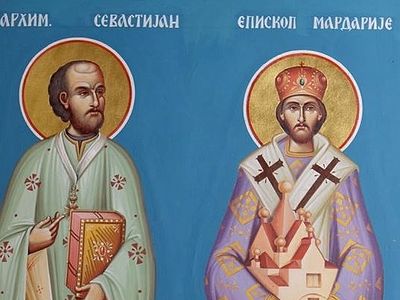While visiting Moscow during the month of June, Archimandrite Irenei (Steenberg), rector of the Sts. Cyril & Athanasius Institute for Orthodox Studies in San Francisco and an Archimandrite of the Russian Orthodox Church Outside of Russia, visited Sretensky Monastery for an interview with Pravoslavie.ru. Father Irenei, a scholar of patristic and early Church studies, is also known as the founder of the Monachos internet forum, dedicated to the study of Orthodoxy through its patristic and monastic heritage, and as the host of the “A Word from the Holy Fathers” podcast on Ancient Faith Radio.
This is the first part of our interview with Father Irenei, which focuses on the nature of the human person and several of the challenges facing modern society.
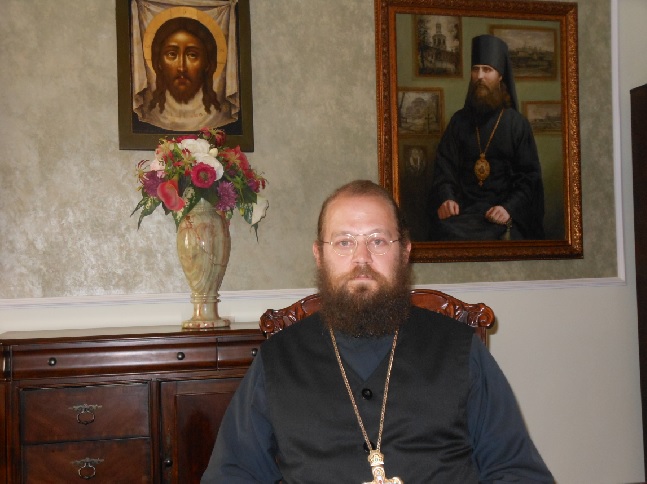 Archimandrite Irenei (Steenberg) at Sretensky Seminary
Archimandrite Irenei (Steenberg) at Sretensky Seminary
—Father Irenei, your writings and work often center on the Church Fathers, and specifically anthropology. What factors influenced you or lead you into that focus and what message does the Orthodox conception of man have for us today in the twenty-first century?
—I suppose what interested me firstly in this theme was the concreteness of the human person. I enjoy the abstraction of some theological discussion, on the metaphysics of Trinitarian relationships, etc. It’s very interesting, and useful in certain contexts. But at the end of the day we’re flesh and blood. I sit and I put down my pen and I look—and I’ve got hands with lines on them, and wrinkles. I’m a concrete being. What do we make of that? The Gospel has always impacted me as being deeply material. Christ becomes flesh, heals with mud, He pours water on people and their sight is restored. That concrete physicality of the Gospel, and of me as a person, is what drew me to want to understand: what is this person? And then we hear these wonderful passages in the Scriptures—Thou hast made man a little lower than the angels… What is man that Thou art mindful of him? (Psalm 8:4, 5)—those questions, ever since I was rather young, really moved me. I wanted to know what the answers were, and I still seek to approach the answers faithfully.
I think also, from a pastoral point of view, that questions over anthropology are increasingly relevant to our modern world. “Anthropology” in academic terms sounds dry and abstract; but we're talking about what it means to be a human person, what it is to be man. And if there’s any singular question that is being challenged in the twenty-first century it’s precisely this. So the moment that we start to think that anthropology is just some ivory-tower theme for academics in their offices, then take a look around. Particularly in America, but even here in Russia—and everywhere in Europe and throughout the world—the most essential, basic definitions of what a human person is are being challenged on a daily basis, so regularly that we almost stop seeing them as challenges and we simply accept this web of confusion surrounding the nature of the human person. So this area encompasses a great deal that is pastorally and practically useful to speak to the modern world. “What is a person?” “How should persons relate to each other?” “How should they relate to God?” These are questions that are only more important in our day than they have been in others.
—In light of all that, there have been some notable cases in the news lately. In regards to the Bruce Jenner/transgender issue I saw at least one article[1] referencing St. Irenaeus, saying this notion of the body being one gender, while the mind or soul is another gender is possibly just a rehashing of Gnosticism that he already defeated. Do you think this is an appropriate application of St. Irenaeus, and what would he say?
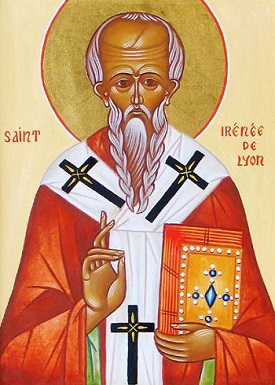 St. Irenaeus of Lyons
St. Irenaeus of Lyons
—We have this upcoming 2016 pan-Orthodox council. Are they considering taking up such questions of sexual immorality and how to pastorally deal with them? Especially in America we even have pastors of the Church who seem to be speaking outright against Tradition.
—With regard to the question of what will be discussed at the council next year, assuming that it does take place on schedule as planned, I think people have become quite obsessed about the issue of the diaspora and what will be done with its canonical organization. Because of that interest, which I think is sometimes excessive, we have not been paying a great deal of attention to other areas that are perhaps far more important to the life of the Church than the question of administrative organization. One of these certainly is approaching the modern world with the consistent teaching of the Fathers. I do believe that on the agenda (though the agenda for the council has not yet been formally set, as far as I know) will be issues like bioethics and social questions in some form. To my mind, one of the things that such a council could do— that would be very helpful, very useful for the generations that follow it—would be to reaffirm the necessity for the pastors of the Church, the priests of the Church, the preachers of the Church, to preach her traditions.
You are quite right that there have been some examples, even just over the last week or two, of Orthodox pastors saying things that no Orthodox Christian has a right to say, and we are reminded that one’s rank does not give one the ability to speak against Tradition. When we see this happening we must call people to account. The only voice with which any Orthodox Christian, whether he’s a laymen or an archbishop, is entitled to speak, is the voice of the Church; and the voice of the Church—despite our modern desire to sometimes twist that voice to be more comfortable—is consistent and clear. When we approach new topics that that voice hasn’t spoken to before (there are issues that don’t exist in the tradition—bioethical questions, for example, didn’t exist in the fifth century), that is where the Church as a whole comes together to discern how her voice should speak. But it’s never up to an individual to speak for the Church; it’s only up to the individual to speak the words of the Church. Our modern, individualistic tendencies sometimes push us in the other direction, and it’s a great tragedy. There’s nothing more sorrowful for me than to receive some newspaper or article where I see a priest of the Church, a “theologian” of the Church, saying something which is quite concretely not in accordance with her traditions. It’s a cause of immense sorrow, and there’s no reason that this should take place.
We all need to become conscious of what we do as Orthodox people, and especially as Orthodox teachers. We are given the responsibility to bear the light of Christ into the world. If we are bearing some other light, including our own, we’re failing. Yet even that is not a cause for anger. Our job is not to become angry at such people. It’s a cause for sorrow that the light that the world receives is not the unadulterated light of Christ. And so it should be our compassion and our love that urges us to do better. Especially when we look out at the world and we see how much suffering there is. Not just physical suffering from poverty, from hunger, but moral suffering that is the result of our laxity in teaching. If we taught people with love, and with zeal of the truth of the Gospel, there would not be such moral suffering, such angst in people’s hearts. This is a sign of our weakness. It ought to be love, rather than anger or fear or judgment that encourages us to do better.
—Another burning issue in America is the reception of converts. And again, thinking of the upcoming council and questions of the diaspora, is there a possibility of moving to a unified system? Is that something we would want? For instance, should all converts be baptized regardless of where they came from?
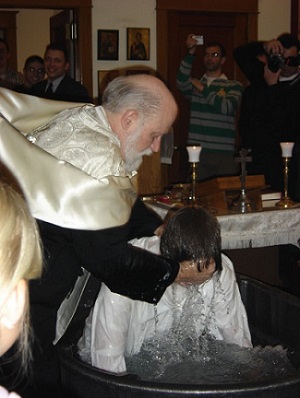
What is far less clear is the condition of Christianity in the twenty-first century, and how it relates to the condition of Christianity in the periods in which those canons were written. The canons were written when, by and large, there was one Church—and that was the Orthodox Church. Any departure from the Church was a departure from Orthodoxy, and it was a question of how to return to Orthodoxy. If you were in schism from Orthodoxy, you were brought back into the Church. But we live in a world now where there are many Christian traditions which are not connected to the Orthodox Church, and this is not a situation most of the canons specifically address. So I do believe that most of our hierarchs agree we need to sit down and talk about how to apply the canonical principles—which are clear and relevant, but need to be applied pastorally to our situation today.
—I’ve seen that certain questions arise from this. If we can receive people from such and such a church by chrismation, what are we saying about the bounds of the Orthodox Church? Are the lines a little more fluid than we think? How do we have these different practices but maintain our strict ecclesiology?
—This is a question to which you’re going to find differing answers from different people. And this is of course an area where the Church needs to speak clearly to the modern world. Yes, it’s true, God does not give us the right to speak about firm boundaries to His grace, and we know that God loves and cares for, and works to save, even those who are outside of the Church. However, within the Church, we know what God has given us as a Church. God has given us holy baptism as a means for entry into the Church. Out of economy we see the life of grace beyond our borders; but God does not call us either to judge or to base our life on what happens elsewhere. Christ commanded us to go and baptize all nations in the name of the Father, the Son and of the Holy Spirit (Mt. 28:19). That must be our consistent goal. Our love for those outside of the Church, and our acknowledgement of the working of God outside the Church, cannot change His commandment to us, which is to go and to baptize. Now, if there are circumstances where, out of economy, the Church says “in this case we will receive by chrismation,” for circumstances specific to this person and not as a global rule—alright. It is within the purview of the hierarchy to exercise this grace, this economy. But the mission of the Church is to baptize all nations, and we must be wary of watering down that mission by being overly concerned about defining the “boundaries of the Church,” defining who is a real Christian, who is not; who is genuinely a believer, who is not. What we know is that the Church has the imperative to baptize, the imperative to draw people into Her life—and that should be our goal, that should be our mission, as it has been for the Apostolic community from the very first.
—On a related issue, again especially in America where there are so few Orthodox people, a lot of our people are marrying non-Orthodox Christians and even sometimes non-Christians. Obviously the ideal is for two Orthodox people to marry. How do you communicate to our young people the gravity of marriage, and the gravity of who we marry?
—I think you phrase the question nicely, in the sense that its beginning is not really in the question of Orthodox and non-Orthodox marriage. The beginning is in a debased understanding of marriage altogether. Marriage has come to be understood simply as the emotional connection between two people. “This person makes me happy.” “I feel what I define as love for this person.” And so if that’s all that marriage is—an emotional bond—then it becomes difficult to say “you should marry this person but not that person.” If marriage is no more than a feeling of attraction or happiness between people, why shouldn’t it be between an Orthodox and a non-Orthodox person, or an Orthodox and a non-Christian person? What’s the justification, if that’s all that marriage amounts to? Our people have lost sight of the fact that marriage is something far more: the co-suffering of a common life in Christ, the purpose of which is to attain the Kingdom of God. The emotional joy that comes and that arrives between a husband and a wife is a fruit of that common work. It is a powerful fruit, but it’s not a persistent, consistent fruit. At times there is great sorrow between a husband and a wife. At times there is a shared agony, at times there is shared grief, and at times, yes, there is a shared, profound joy. But what is consistently shared is the struggle for the Kingdom of God. This is the Orthodox vision of marriage: two lives joined together, so that together they can struggle more deliberately for Christ’s Kingdom.
Now, when we see that as the definition of marriage, it becomes much clearer why a marriage should be between two Orthodox people. How can we struggle together for the Kingdom of God if we don’t believe the same things about that Kingdom? Can it be done? Is it possible? The Church says, “Yes”—she makes exceptions for certain cases. But the Church always says, in these cases, “You are taking on your shoulders a much more difficult cross.” We have the witness of the Scriptures that a believing wife can sanctify a disbelieving husband, and vice versa; but that is toil and a cross! Far better that the wife should sanctify the husband while the husband sanctifies the wife. This is the ideal of marriage that the service of marriage anticipates. Marriage to a non-Christian, while understandable in civil terms, is almost incomprehensible in Church terms because it immediately divorces the idea of marriage from its ascetical aspect. If someone does not even believe in Christ at all—how can that marriage be a co-suffering for His sake? And again, the Church makes exceptions for interfaith marriages between people of different Christian backgrounds; but we should be encouraging our young people to see what marriage really means and to view it as an ascetical offering of a life for Christ.
This is connected to the way that someone becomes a monk or nun. If a person is devoutly Orthodox and wants to join the monastic life, he doesn’t go to a Roman Catholic monastery to do it. He doesn’t go to a Protestant monastery to do it (though there aren’t many of those to choose from). He goes to an Orthodox monastery; and the thought of going to a monastery of a different tradition would seem scandalous and absurd. But the monastic life and the married life are parallel, and in the married life, unfortunately, it seems less absurd to go to other traditions. Again, we must trust in the Church’s economia, that marriages between those of different faiths can be fruitful and can bear sanctity and grace; but we know what the clear standard of the Church is, and it should always be that at which we aim. Economia should never be the norm we are striving for. It should be that which is exercised for specific reasons in specific cases.
—It seems that the proper anthropology and the concreteness of it that you spoke about before would go hand-in-hand with properly understanding marriage.
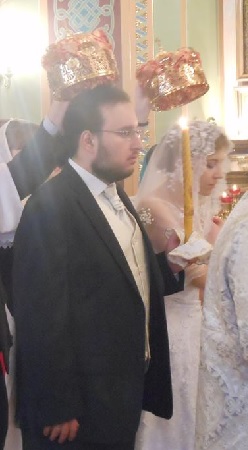
—You are American and serve in America, but you obviously have close ties with Russia and the Russian spiritual world. What lessons do you think in American Orthodoxy can we learn specifically from Russia, and vice versa—is there anything that the American Church has to teach Russia?
—I’ll start with the easier question, which is “What can the Church in America learn from Russia?” A great deal. One of the reasons that our connection to the Russian Church in America, as the Russian Church Abroad, is so important to us is that we are consciously aware of the spiritual legacy of the Russian people, which is our own legacy, our own history. The Church in America is an extension of that Russian heritage. The missionaries came from the Russian lands; the Orthodox culture began in America from the Russian mission, and we exist today as the Russian Church Abroad very much in a conscious, lived expression of that Russian history. It is something we cherish because it is a long, mature life.
I think sometimes in America we forget how young the country is. This is a nation still in its adolescence. That is a beautiful thing. Adolescence is a time of growth, of maturity, of beginning to see life in deeper ways. Each person goes through this, and nations go through this as well. But just as all persons in adolescence strive to skip through adolescence and be “all grown up” as soon as possible, this is also a tendency amongst nations and amongst peoples, and one of the greatest things we learn from our mother in the faith, the Russian culture, is the patience of maturity, the patience of a thousand-year-old faith, the patience of ten centuries of Church life— the patience to be patient. In any period of adolescence there is an inherent impatience, and we suffer from this in America. We want to stand on our own two feet with no one holding our hand. But we need our hands to be held. We need the loving embrace of a spiritual mother to give us a necessary maturity. Maturity is not something you ever attain on your own. You receive it, you are given it—and we are grateful for that.
The long-suffering of the Russian people is another profound example that those in America must learn from: the ability to suffer in quiet, the ability to suffer without growing weak. The witness of the Russian Church in the twentieth century under the communist yoke, under the atheist yoke, is a profound example for America now. America is not coming under, so far as I know, any communist yoke, but it is most certainly coming under an atheist yoke. It is secularist atheism rather than communist atheism, but it is nonetheless an atheist regime. How to deal with that is a question that we must lay before the example of the Russian Church, which has been through this before. Now, the circumstances are different, and we cannot simply emulate everything; but the ability to maintain the faith under atheistic influence is not something that needs to be invented. This is not a skill that must be come up with in America! We can look to our forebears and gain from them the witness of long-suffering, of patience, of stability, which I think we need very much in the diaspora now.
Is there something that the Church in America can offer to the Church elsewhere? Of course there is. Everyone has the ability to learn from everyone else; so I don’t want to shy away and say “No, we’re too young, we have nothing to teach.” But I also don’t want to be imperialistic and say, “Look what we can offer the ancient world!” But if we genuinely believe that every person is an icon of Christ, then we have to believe also that the Church everywhere is an image from which we gain spiritual edification. And the Church in America is a Church of mission. It’s a Church that exists in a culture more or less completely foreign to Orthodoxy. Not a culture like communism was in Russia, that grew up in antipathy to Orthodoxy, specifically against it; but a culture that doesn’t care, a culture that doesn’t know what it is, a culture that “can’t be bothered.” And the Church in America is gaining experience in how to respond to those sorts of questions, which are different from questions in the old world. Here in Russia these questions are rather novel, whereas in America they’ve been the framework for the life of the Church for 200 years—how to speak to people who have no idea what Orthodoxy is, or who have no idea what religion is, who just simply don’t care. So yes, we have experience that also can be shared. But we need to be very careful—the individualistic emotion can become very quickly a triumphalist one. Better to be humble and to simply share our experiences than to think that we have something to teach others.
—Your mention of missions in America leads directly into my next question. We’ve had several great missionary saints in America, and we just canonized two more—Sts. Sebastian and Mardarije. But as you said, the mission field is still wide open in America. Do you have any particular vision for missions and evangelism in America, any particular insights or thoughts on some specifics we can do?
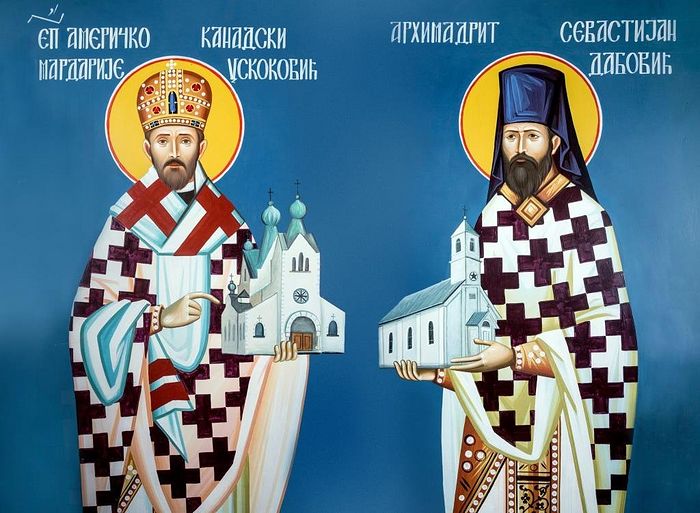 Newly-glorified Sts. Mardarije and Sebastian
Newly-glorified Sts. Mardarije and Sebastian
The reason I think we have become stagnant in our missionary life in North America is that we have focused far too much on the “logistics” of talking to the world. We try to speak in the same language that the politicians speak, or the same language that other religious traditions use; we try to be “culturally relevant;” we try to be socially acknowledged—none of which really helps us in our missionary work. It is a delusion to think that if we become more engrained into the political system, if we become more accepted socially or culturally, that we’ll then be able to speak more effectively to the people. It’s never been the people that have “blended in” that have been the good missionaries. It’s been the people who stood out, who spoke even when people did not want to hear what they had to say. St. Herman of Alaska, one of the greatest missionaries to America, is a wonderful example of this. Nobody liked what he had to say. If you look at the politicians of the day, if you look at the trading companies, the businesses—nobody wanted to hear what he had to say. But he said it with boldness because it was true and because there was nothing else for him to do. That was all his heart could do. And the world changed. People by the hundreds and thousands were converted, despite the fact that everyone in power wanted him to disappear.
Today we’re too interested in speaking to those in power. There is the constant temptation to issue statements that the president will listen to, to speak through congressional channels, and the like. We want to fit into the social activities of the world. This is not the way to speak. This is not the way to be a missionary. We have “lost our salt.” This image is salt pricking the tongue. It gives flavor by having bite to it. Now this isn’t to say that we should get our soap boxes out and stand on the street corner and condemn passers-by—that doesn't have the power to convert anybody. We need first and foremost to be less interested in what the world thinks, more interested in attaining a real Christian life, and then once that is attained to speak it without reference to the world’s speech. Who cares what the politically normal way of talking is? Who cares if what I say will be reacted to poorly by such and such a social group? If it’s true, say it. Don’t say it to preach, but say it when God stirs your heart to share the gospel with another person. If we can do that, and if we would do that, America remains an enormous missionary field. There are so many lives there suffering for want of the true gospel, and we don’t bring it to them. That is a shame upon us, and it is something that has to change. We have to reclaim our boldness and our zeal as Christian missionaries.
—It seems to me that there is a hesitation sometimes just to speak, to literally speak the gospel. There’s this quote that’s sometimes attributed to Francis of Assisi, “Preach the gospel at all times, and when necessary use words,” and this seems to have gotten traction even in Orthodox circles—this division between how you live and what you speak.
—It is absolutely true that the chief way we share the gospel is through our lives. The chief way that I am able to share with you anything about Christ is by living my life in Christ. The chief way I can tell you about the love of God is to show you the love of God. The chief way I can teach you about repentance is to show you repentance in my own life. This is true, and this is a fundamental truth of Orthodoxy. But, we have begun to use it as an excuse not to speak, and we must call back to our Tradition. If we look at the lives of the Holy Apostles, these were men who lived the faith, who first and foremost taught others by their lives; but these were also men who spoke. They spoke the Gospel. If we look at the great teachers and preachers, too: these were men who lived, but who also taught, and I’m afraid that sometimes we use the idea of being missionaries through our lives—which is true and important—as an excuse not to stand up and speak. And the fact of the matter is we are so weak in our spiritual lives that oftentimes we are not the lights on the hill that we think we are, that we ought to be, and we must augment our lives with the Gospel’s teaching.
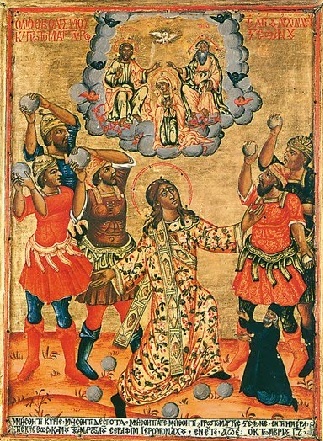 The marytrdom of St. Stephen
The marytrdom of St. Stephen
—You’re a monk, but also you’re quite active. It seems you travel quite a lot, and I remember a quote from Elder Cleopa saying that when he leaves his monastery and goes to the city it takes him weeks to regain his peace. Modern man is often on the go. What can you say about maintaining inner peace, and finding it again when we have lost it, in our busy world?
—I should start by saying that I wish I myself were better at this. I do travel and it is a struggle. But there is a principle in the Orthodox life: that peace travels with you if it lives in your heart and isn’t simply a set of circumstances. If what I identify as peace is a quiet room, a lack of busywork, a lack of noise, a lack of people, a lack of distractions, it’s easy for that peace to be taken away from me the moment that I’m removed from that nice quietude into a bustling environment. If, however, peace is a condition of interior quietude, where the heart is resting in Christ even in the midst of a city, then you have a peace that cannot be taken away, a peace that travels with you.
Now, this is not at all to go against the saying you mentioned. Even St. Anthony, so many centuries ago, said “a monk out of his cell is like a fish out of water.” Yes, of course there are places that God gives us specifically to foster peace, and when we depart from those places—like a monk from his cell, or a priest from his parish, or a husband from his wife—when circumstances force a person to move away for a time from the environment that God has given him to create peace, of course when you go back there are long periods of readjustment to get back what you had lost. But that doesn’t negate the fact that there can be a peace in the heart that is not specific to a situation or to a place. This is the peace that we see in the martyrs, who remain peaceful when they are at home or when they are in the arena with the lions; who remain peaceful when they're preaching amongst friends, or when they’re on the pyre and the flames are licking their feet—the peace that passes all understanding, as the Scriptures put it (Phil. 4:7). And that’s what we have to foster if we are to even remain sane in the modern world, because the modern world strives to steal our peace from us all the time. The world is a constant hive of distractions; and if our peace is external, then the world will win. It will always win, in that sad circumstance. But if the peace of Christ lives in the heart, then the world can’t defeat it.
How do we attain that peace? We attain that peace by striving to live the life of the Church, praying so far as we can with consistency, every day letting prayer infuse our lives. That’s not to say everyone needs to have a three-hour prayer rule, but whatever one’s rule of prayer, it has to be consistent so that that breath is there every day. Confess regularly, frequently, because that empties the heart of the enemies of peace. It empties the heart of turmoil and torture and pain which prevent peace from residing in the heart. To confess frequently, regularly, to pray every day, so far as is possible to go to the services as regularly as one can, to be compassionate to other people, forgive those who wrong us—these are the things which create peace and which can be exercised anywhere. You can forgive your enemies on the bus just as easily as you can at home, if you, at that moment, in your heart determine not to hold onto your bitterness. So the whole world can be an avenue of gaining peace, if you understand peace to be inward. Of course it’s much easier in the places that God anoints for peace-making—in a temple, in a cell, in a marriage—which is why God blesses those things. It’s why God gives us temples and marriages and monasteries. But God has also created the world, and as much as we distort and disfigure the world, it is still His world. God will use even this fallenness that we have fashioned, for our redemption. So in the midst of society, in the midst of a city, there’s the opportunity for peaceful hearts.
To be continued: "If Only We Would Take Seriously Our Spiritual Lives, We Would All be Saints:" A Conversation with Archimandrite Irenei (Steenberg), Part 2


